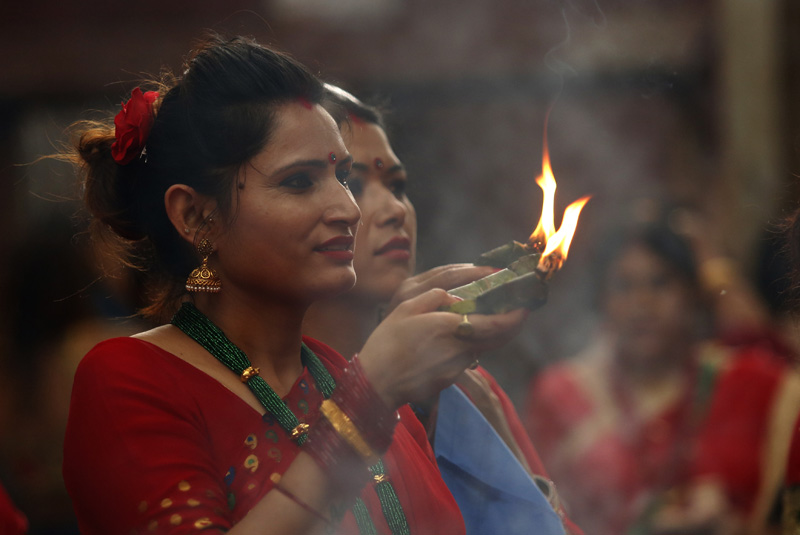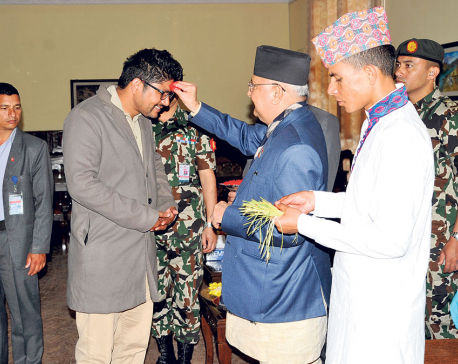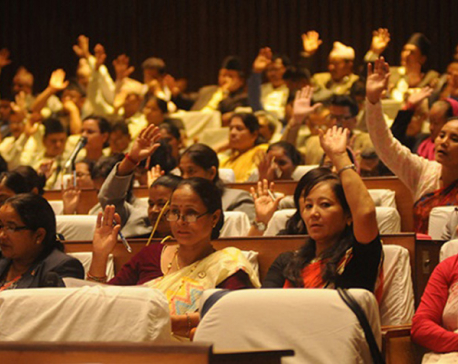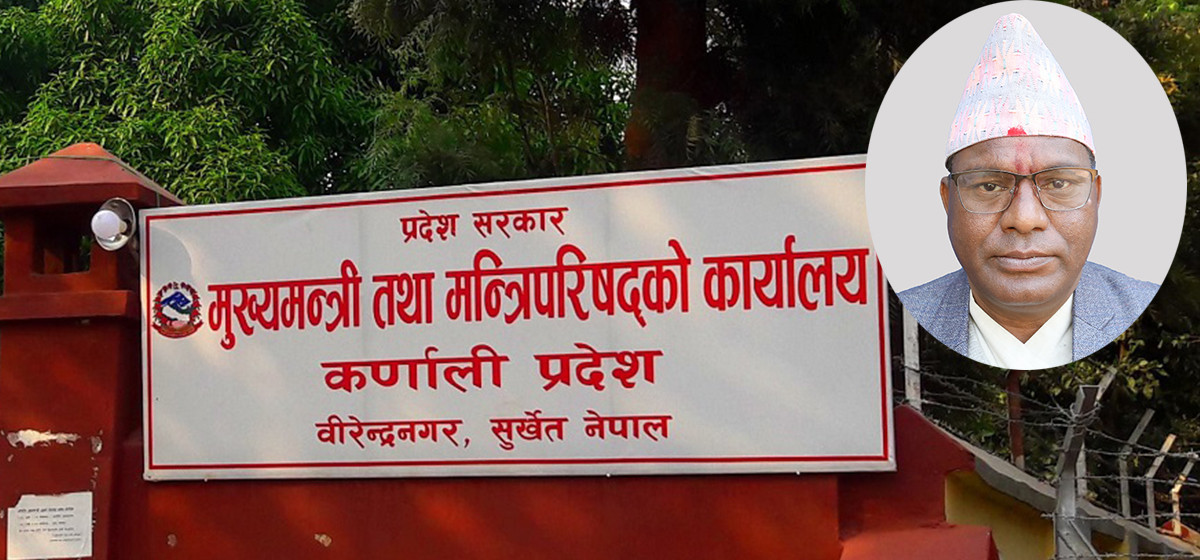
OR

Usha Pokharel
Usha Pokharel is an educationist and author of several children’s books.usha@pokharel.net
With the end of monsoon, festive season starts. One more time I question the rationale behind the common representation of women as weak personalities and then their juxtaposition along strong deities like Parbati, Durga Kali, Laxmi, and Saraswati! Even our mythology cannot decide whether women are equal to men! They have Sita, Draupadi, Radha/Rukmini all depicted as weak characters who cannot fend for themselves, whereas Krishna is known as Devakinandan, Yashodhanandan, and there is Gaurinandan, not to mention Shiva’s depiction as Uma pati or Bishnu’s as Laxmi Narayan.
Not just the Gods, even the Demons thought women are weak. So they usually asked to be killed by women if their request for immortality was not granted. They thought the weak women would never be able to kill them. So here come Durga and Kaali.
It almost feels like our ancestors could not make up their mind as to whether women are weak or strong. No, I am not joking. Take a look at the festivals. Rakshyabandhan/rakhee marks the beginning of social activities, rituals and customs. Then comes Teej, with married women fasting for that special person already in their life and the unmarried, to find that special person. With this fasting there is dancing, singing, getting together with friends, and sharing the festive mood. This is all well and good but I always had a question. If women fast for their special person, men get theirs’ without fasting? I know it sounds hilarious but women still fast for the longevity of their husbands.
Recently my grandson and granddaughter were visiting from Poland. When they saw henna on my hand, they wanted to know the reason for it. I told them people usually put it during the month of Shrawan. A few days later I see them both sporting henna on their hands. So I asked my grandson why he had one on his arm. His answer made me think twice. He said, ‘If girls can have one, why can’t I?’ Good enough, I thought. Too bad he had to leave before Teej. I am sure he would have fasted on Teej and his would have been a very good reason too. If girls pray for a good partner or good health of their boyfriends why can’t I? I think given the opportunity, Shiva too would have prayed for Parbati, as Shiva is the other half of Parbati or vice versa considering Shiva’s Ardha-Nari-swarroop.

Protecting men
So if mythology gave conflicting messages and depicted women as weak, our men are no exception, always laying down rules in the name of protecting women. Remember the time when a four-year-old boy accompanied his 20-year-old sister in the name of protecting her? Well that has been to some extent done away with now, but still the stigma is there. Women should not go out alone.
I am sure you have been following the news in the Indian media about a girl travelling alone in her car at 12 at night who was trolled by a car driven by MP’s son. The comment by a BJP neta cracked me up. What was the girl thinking, he asked, going out in the middle of the night alone? It’s not just the men; women also think of themselves as weak. Women are conditioned in such a way that they fail to understand they too are strong and always feel the need for a man to protect them.
Coming back to the festivities, there is rakshabandhan/rakhi, where a sister ties a beautiful rakhi on her brother’s wrist seeking protection from him. This reminded me of a beautiful commercial I saw on Indian TV the other day. A commercial for Cadbury chocolate, it made perfect sense to me. In the commercial the girl tells her brother that she is tying the rakhi for the chocolates and not for his protection at all. She is capable of protecting herself!
Then comes Dasain: the embodiment of the victory of good over evil, that too at the hands of Durga, a female deity. It is a celebration of tika as her prasad and good food. Now you might be thinking, ‘so what is new here?’ Well look closely at the ashirbaad women get: ‘Saubhagyabati bhava!’ In other words, ‘may your husband live forever’! Isn’t that hilarious? Men found a way to get blessed through their wives after all. Anyway, this whole thing about blessing is a bit biased so far as married women are concerned. Actually I think the women should also put tika on their husband’s forehead and bless them and then it would be equal! And they would get blessed directly and not through their wives.
The insecure sex
At this point, a question comes to my mind, ‘after all, who is the insecure sex?’ Is it men and their ego is unable to accept it? Or is it women because of their being too nice and tolerant and not in a hurry to get out and claim equality? Rather women have taken up the role to protect men. If you don’t believe me, take a look at the tihar/bhaitika. It’s called bhaitika and not bhai/bahinitika! Here again women do all sorts of rituals to protect their brother, so they can protect their sisters. Complicated affair!
I have nothing against men or our culture. It’s just something that I had been questioning all along. I would like to mention here that one of my grand-daughters is nine and has a black belt in Karate. So if push comes to shove, she is more than capable of protecting not just herself but also any other adult in need of protection. So parents, regardless of their sex, raise your children to be strong individuals, who understand the rituals, take them seriously but are not bound by them. Go ahead and explain the situation when these rituals were put in place and for what purpose and why they make less sense now. Have them respect rituals for what they are and let them consider the spirit of it.
Finally, teach your children to respect our tradition in good spirit and make changes where you are comfortable doing it. If not, just enjoy it. Consider Teej as a festival of goodwill, peace and longevity for all, Dasain-tika for what it is, Devi Durga’s Prasad from elders and Tihartika as bhai/bahinitika with a promise to protect each other. Similarly, Rakhee can easily be turned into a festival of brothers and sisters, with each tying a rakhee on the other’s wrist, thus converting it into an awesome festival for brothers as well as sisters!
That will make everyone happy without feeling discriminated. Enjoy and live up the spirit of the festivities. Now that is not a big deal while enjoying the upcoming festivities, right parents?
The author is an educationist and author of several children’s books. usha@pokharel.net
You May Like This

Can equality pledges fix country music’s gender problem?
What started as a joke on Twitter about an unwritten rule among country radio stations not to play two female... Read More...

Eight months of disappointment: Oli wave is fading
KATHMANDU, Oct 23: When the chairman of the erstwhile CPN-UML, KP Oli, got elected as prime minister in February, many... Read More...

Voice for equality
Nepal’s Female Labor Force Participation Rate is 80 percent. But women have a long way to go achieve gender equality Read More...






Just In
- National Development Council meeting on Thursday to finalize 16th Plan
- Qatar Emir meets PM Dahal, bilateral agreement and MoUs signed between Nepal and Qatar
- Employee involved in distribution of fake license transferred to CIAA!
- Youth found dead in a hotel in Janakpur
- CM Kandel to expand cabinet in Karnali province, Pariyar from Maoist Center to become minister without portfolio
- Storm likely to occur in Terai, weather to remain clear in remaining regions
- Prez Paudel solicits Qatar’s investment in Nepal’s water resources, agriculture and tourism sectors
- Fire destroys 700 hectares forest area in Myagdi



_20240423174443.jpg)









Leave A Comment